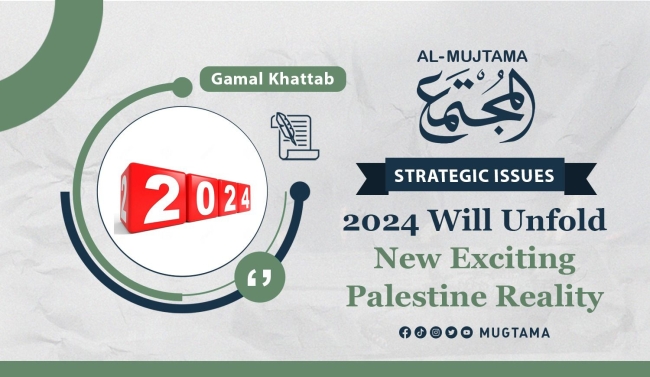2024 Will Unfold New Exciting Palestine Reality Featured
The Current Situation
The year 2024 brings exceptional and unprecedented circumstances for Palestine. The war on Gaza, known as Operation Al-Aqsa Flood, carried out by the military arm of Hamas, the Al-Qassam Brigades, has been dominating the region since October 7.
This is the most violent confrontation the Palestinian resistance has faced in Gaza since Hamas took control in 2007. The repercussions of this war will create a new reality for the Palestinian issue, the Gaza Strip, and even impact the Israeli and Palestinian political scenes.
A New Stage
On October 7, the Palestinian resistance in Gaza launched a well-organized attack on Israeli military, security, and intelligence sites and settlements. This attack resulted in the Israeli occupation army's "Gaza Division" being taken out of service. The resistance also captured several soldiers, officers, and civilians, some of whom were later released in a partial exchange deal.
With this attack, the resistance has shown that it will no longer tolerate Israel's control over the Gaza Strip. They have set a new path to confront Israel's violations in Jerusalem, the West Bank, and Gaza.
Israel Impossible Goals
Israel's goal of eliminating Hamas and dismantling its capabilities seems doubtful. Hamas has deep roots in the Palestinian situation, especially in Gaza, where they have been in control for 17 years. Israel's lack of clear criteria to measure the achievement of this goal raises further doubts.
Real Challenges
Hamas continues to carry out operations against the Israeli occupation army, proving their ability to challenge Israel's control. The recovery of prisoners also poses a challenge, as Hamas has announced a cessation of exchanges.
The Day After the War
After the war, Israel faces another challenge. Proposals for the presence of peacekeeping forces or intervention forces to maintain stability in Gaza seem difficult to implement. If Israel refuses to withdraw from Gaza, it may find itself entangled in the region without any support.
Choosing to remain an occupying force will not be easy for Israel, as the Palestinian resistance can continue fighting with simple means, inflicting losses on the Israeli occupation army, especially in urban areas with widespread popular support.
A New Approach
The Biden administration is proposing a "renewed" Palestinian Authority to govern the Gaza Strip after the war. However, this idea faces challenges because many people in Gaza reject this authority and its symbols. Additionally, the Netanyahu government and the extreme right-wing movement within it also oppose this option. They want to eliminate the Palestinian issue altogether and even have plans to annex the West Bank and displace Palestinians from their homes.
The Reality of the Situation
Israel cannot realistically reoccupy the Gaza Strip and endure a prolonged war there. Eventually, they will have to withdraw, but not before causing destruction and reimposing a siege on Gaza. This leaves the Palestinians with the option of continuing their resistance to regain their position through the Hamas movement.
Implications for the Region
The return of the Palestinian issue and the ongoing confrontation in Palestine will create a new reality in the region. It will bring about changes in security and politics, shifting the focus from integrating Israel into the regional system to a more fragile and volatile environment.
Security Challenges
The recent events have led to a new security and strategic concept for Israel. They now face security challenges from groups like Hezbollah in Lebanon, Ansar Allah in Yemen, and armed factions loyal to Iran in Syria and Iraq. This requires Israel and the United States to adopt new security approaches.
Arab Reaction
The war on Gaza has also affected the Arab world. Many people see the official Arab position as incapable of confronting Israeli aggression and not providing enough support to the Palestinians in Gaza. This may lead to popular reactions in the Arab world, similar to what happened after the 2008-2009 war.
Uncertain Future
The region, which the United States aimed to stabilize and promote cooperation among its allies, now faces a completely different situation in 2024. This opens the door to potential military and political escalation, as well as social transformations.
The Impact on the United States
As the United States enters a decisive election year, the situation in the Middle East will have a significant impact on its results. The outcome of the war and its aftermath will shape the political landscape and influence the decisions made by the American people.


